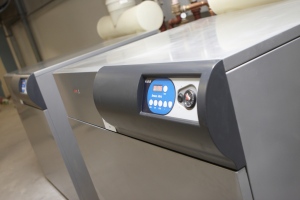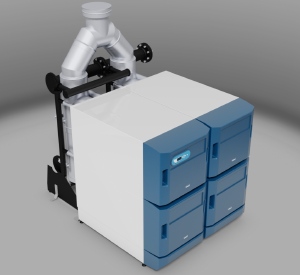Part L is just a starting point

Darren Finley of Ideal Commercial Boilers, looks at how the new Building Regulations and the demands of the forthcoming ErP will offer challenges and opportunities for manufacturers by creating demand for innovative solutions and giving them the chance to lead the way in intelligent product development, problem solving and new ways of sharing their expertise.
The delayed amendmentss to Part L of The Building Regulations, scheduled for implementation in April 2014, will demand a 9% reduction in carbon emissions for new commercial buildings compared to the requirements outlined in the current regulations. The Government predicts that this, amongst other changes, will reduce the country’s emissions by 6.4 Mt of CO2 and result in lower running costs, which will benefit businesses across the country.
The new Building Regulations have also addressed concerns in the industry that the actual operational efficiency of buildings might not match the efficiency predicted during the design stage, and has done so by amending some of the requirements relating to Energy Performance Certificates (EPCs) and Display Energy Certificates (DECs). These are monitored by the Energy Performance of Building Directive (EPBD) and are specifically designed to demonstrate whether a building is actually able to achieve, or is achieving, the required efficiencies. The changes that will be enforced in April include the requirement for EPCs to be displayed in commercial premises larger than 500 m² where one has previously been issued and for public buildings above 500 m² to display a DEC
Legislation from the EU
However, the new Building Regulations is not the only piece of forthcoming legislation that is destined to have a dramatic impact on the industry. The Energy-related Products (ErP) Directive, scheduled for implementation in 2015, is seen by the EU as the most important initiative that has ever been unrolled to improve energy efficiency across Europe. The focus of the directive is on actual energy-using products, and the framework will see the utilisation of an energy-labelling system that will categorise products based on their efficiency, with different types of products separated into various ‘Lots’.
 |
| Boilers that are available today, such as Ideal’s xxxxxx range, can already meet ErP requirements due to come into effect in 2015. |
At Ideal Commercial Boilers, the area of interest is naturally space-heating boilers, which provide a good example of the high efficiency levels the directive will be looking to enforce for all high energy-using products in buildings. Boilers are found in Lot 1 of the directive and are treated with particular attention, which is not surprising considering these appliances are the central component of many heating systems and, in the UK at least, account for about a third of the energy used by buildings. They are also the ‘backup’ heat source for many renewable technologies, so they will remain an integral element of space-heating systems for the foreseeable future, even with the introduction of low-carbon alternatives.
The minimum boiler efficiency requirements stipulated by the ErP are predicted to be equivalent to an 88% gross efficiency, which is a 4% increase compared to current requirements, taking boilers to the limit of what is achievable from current condensing technology. This would mean that, following the directive’s implementation, any boiler with an output of 70 to 400 kW that is not condensing will fail to meet the minimum efficiency requirement and would not therefore receive its CE certification. Although many sections of the ErP Directive, including those relating to boilers and the exact efficiencies required, are still awaiting regulatory consultation, there is no doubt that the industry is demanding increasingly energy-efficient products — with the likelihood that, in the very near future, there will be no place for standard-efficiency products like non-condensing boilers.
Sharing Information
It is clear that manufacturers of commonly-used energy-using products such as boilers will need to be ahead of the game in developing increasingly efficient and easy-to-install solutions. The need for buildings to comply with The Building Regulations and other legislation does, however, have its benefits by providing an obvious shared goal, which is helping to fuel the shift in the industry away from a competitive framework and towards a more collaborative approach. This evolving perspective recognises that information must be accessible throughout a building project to ensure the efficiency of the completed buildings actually meets the relevant regulations in practice.
 |
| BIM components are 3D models that are data-enriched with essential technical information that can be inputted into the building designer’s software. |
This is why Building Information Modelling (BIM) is coming into its own as one of the most in-depth and effective means of managing information during construction, as it is designed to ensure that the expertise of all members of the supply chain is easily accessible.
Once again, manufacturers have plenty of opportunity to become involved by providing their own BIM components, which are 3D models that are data-enriched with essential technical information that can be inputted into the building designer’s software. Using the example of space-heating boilers, vital information such as boiler efficiencies, outputs, clearance zones and any other important information is easily accessible in one place and can be easily inputted into the overall building or system efficiency calculations. A BIM component can usually be downloaded from the manufacturer’s website or from dedicated hosting sites such as bimstore.co.uk.
Looking to the Future
Edward Davey, Secretary of State for Energy & Climate Change, wrote the introduction to a document entitled ‘The future of heating: a strategic framework for low-carbon heat in the UK’, where he comments how ‘natural gas will supply the majority of our heat demand well into the 2020s’.
As we are going to be reliant on fossil fuels for the foreseeable future, carbon reduction will have to be managed through energy and resource efficiency as much as by the development of new technologies, and the expertise of manufacturers, particularly those providing fundamental heating appliances such as boilers, will be as vital as ever in supporting the industry as it moves forward into more energy-efficient territory led by innovation and enforced by changing legislation.
Darren Finley is national sales director with Ideal Commercial Boilers







